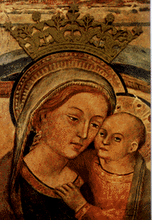 (photo credit - "Isabella's Deathbed")
(photo credit - "Isabella's Deathbed")Question: Maria, why can one no longer gain merits in Purgatory, when one can on earth?
Answer: Because at the moment of death, the time to earn merits is over. For as long as we are living on earth, we can repair the evil we have done. The souls in Purgatory envy us of this opportunity. Even the angels are jealous of us, for we have the possibility of growing for as long as we are on earth.
Question: But often, the suffering in our lives leads us to rebellion, and we have great difficulty in accepting and living it. How can we live suffering so that it bears fruit?
Answer: Sufferings are the greatest proof of the love of God, and if we offer them well, they can win many souls.
Question: But how can we welcome suffering as a gift, and not as a punishment (as we often do), as a chastisement?
Answer: We must give everything to Our Lady. She is the one who knows best who needs such and such an offering in order to be saved.
We should not always consider sufferings as a punishment. It can be accepted as expiation not only for ourselves, but above all for others. Christ was innocence itself, and He suffered the most for the expiation of our sins. Only in Heaven will we know all that we have obtained by suffering with patience in union with the sufferings of Christ.
Question: Maria, do the souls in Purgatory rebel when faced with their suffering?
Answer: No! They want to purify themselves; they understand that it is necessary.
Question: What is the role of contrition or repentance at the moment of death?
Answer: Contrition is very important. The sins are forgiven, in any case, but there remains the consequences of sins. If one wishes to receive a full indulgence at the moment of death — that means going straight to Heaven — the soul has to be free from all attachment.
Question: Maria, I would like to ask you: at the moment of death, is there a time in which the soul still has the chance to turn towards God, even after a sinful life, before entering into eternity — a time, if you like, between apparent death and real death?
Answer: Yes, yes! The Lord gives several minutes to each one in order to regret his sins and to decide: I accept, or I do not accept to go and see God. Then we see a film of our lives.
I knew a man who believed in the Church's teachings, but not in eternal life. One day, he fell gravely ill and slid into a coma. He saw himself in a room with a board on which all his deeds were written, the good and the bad. Then the board disappeared as well as the walls of the room, and it was infinitely beautiful. Then he woke up from his coma, and decided to change his life.
Answer: Because at the moment of death, the time to earn merits is over. For as long as we are living on earth, we can repair the evil we have done. The souls in Purgatory envy us of this opportunity. Even the angels are jealous of us, for we have the possibility of growing for as long as we are on earth.
Question: But often, the suffering in our lives leads us to rebellion, and we have great difficulty in accepting and living it. How can we live suffering so that it bears fruit?
Answer: Sufferings are the greatest proof of the love of God, and if we offer them well, they can win many souls.
Question: But how can we welcome suffering as a gift, and not as a punishment (as we often do), as a chastisement?
Answer: We must give everything to Our Lady. She is the one who knows best who needs such and such an offering in order to be saved.
We should not always consider sufferings as a punishment. It can be accepted as expiation not only for ourselves, but above all for others. Christ was innocence itself, and He suffered the most for the expiation of our sins. Only in Heaven will we know all that we have obtained by suffering with patience in union with the sufferings of Christ.
Question: Maria, do the souls in Purgatory rebel when faced with their suffering?
Answer: No! They want to purify themselves; they understand that it is necessary.
Question: What is the role of contrition or repentance at the moment of death?
Answer: Contrition is very important. The sins are forgiven, in any case, but there remains the consequences of sins. If one wishes to receive a full indulgence at the moment of death — that means going straight to Heaven — the soul has to be free from all attachment.
Question: Maria, I would like to ask you: at the moment of death, is there a time in which the soul still has the chance to turn towards God, even after a sinful life, before entering into eternity — a time, if you like, between apparent death and real death?
Answer: Yes, yes! The Lord gives several minutes to each one in order to regret his sins and to decide: I accept, or I do not accept to go and see God. Then we see a film of our lives.
I knew a man who believed in the Church's teachings, but not in eternal life. One day, he fell gravely ill and slid into a coma. He saw himself in a room with a board on which all his deeds were written, the good and the bad. Then the board disappeared as well as the walls of the room, and it was infinitely beautiful. Then he woke up from his coma, and decided to change his life.
(source: The Amazing Secret of the Souls in Purgatory, published by Queenship Publishing Co)
More in subsequent posts!




















01.jpg)





























No comments:
Post a Comment